Human Rights and Health: A Case Study of New Zealand
VerifiedAdded on 2022/11/04
|8
|3193
|488
Essay
AI Summary
This essay analyzes human rights issues and their relationship to health in New Zealand, focusing on the country's adherence to international conventions like the Convention on the Rights of the Child and the Convention on the Rights of Persons with Disabilities. It highlights significant issues such as domestic violence, health disparities, and child abuse, providing statistical data and discussing the government's efforts through legislation and advocacy. The essay explores the impact of these issues on the well-being of individuals, particularly children, and the role of advocacy services in addressing these challenges. The research also examines the methodologies used in gathering and analyzing data, emphasizing the importance of human rights in ensuring the health and safety of all individuals.
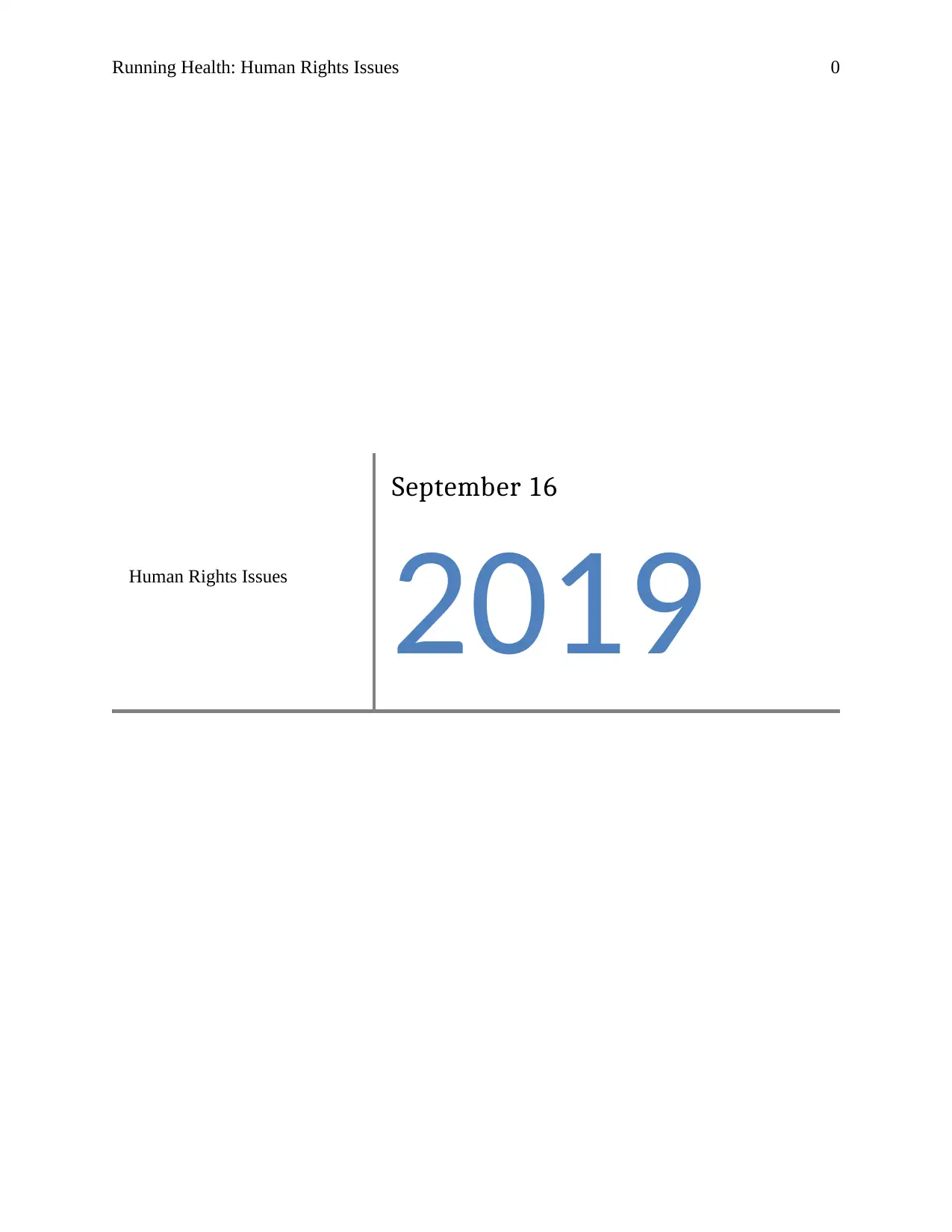
Running Health: Human Rights Issues 0
Human Rights Issues
September 16
2019
Human Rights Issues
September 16
2019
Paraphrase This Document
Need a fresh take? Get an instant paraphrase of this document with our AI Paraphraser
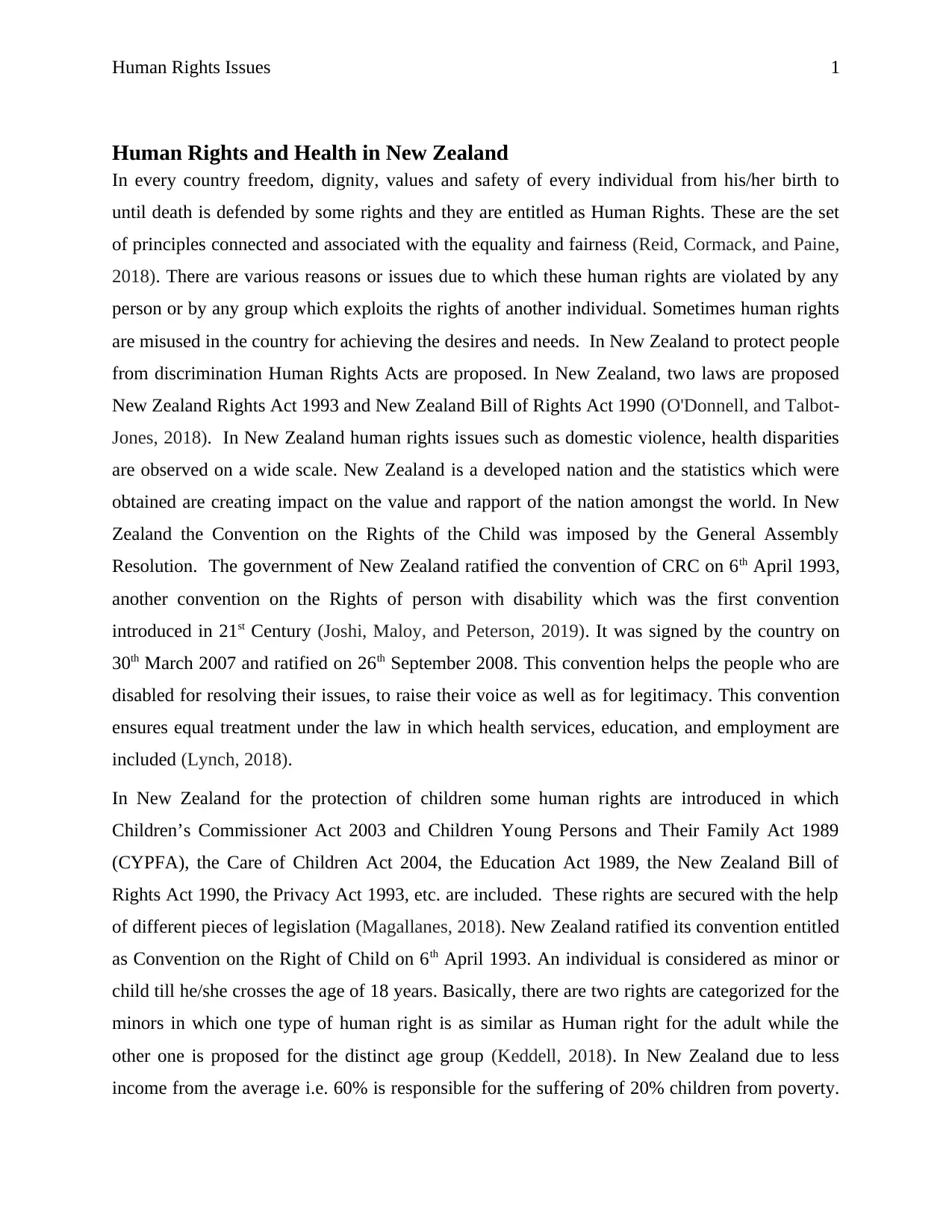
Human Rights Issues 1
Human Rights and Health in New Zealand
In every country freedom, dignity, values and safety of every individual from his/her birth to
until death is defended by some rights and they are entitled as Human Rights. These are the set
of principles connected and associated with the equality and fairness (Reid, Cormack, and Paine,
2018). There are various reasons or issues due to which these human rights are violated by any
person or by any group which exploits the rights of another individual. Sometimes human rights
are misused in the country for achieving the desires and needs. In New Zealand to protect people
from discrimination Human Rights Acts are proposed. In New Zealand, two laws are proposed
New Zealand Rights Act 1993 and New Zealand Bill of Rights Act 1990 (O'Donnell, and Talbot-
Jones, 2018). In New Zealand human rights issues such as domestic violence, health disparities
are observed on a wide scale. New Zealand is a developed nation and the statistics which were
obtained are creating impact on the value and rapport of the nation amongst the world. In New
Zealand the Convention on the Rights of the Child was imposed by the General Assembly
Resolution. The government of New Zealand ratified the convention of CRC on 6th April 1993,
another convention on the Rights of person with disability which was the first convention
introduced in 21st Century (Joshi, Maloy, and Peterson, 2019). It was signed by the country on
30th March 2007 and ratified on 26th September 2008. This convention helps the people who are
disabled for resolving their issues, to raise their voice as well as for legitimacy. This convention
ensures equal treatment under the law in which health services, education, and employment are
included (Lynch, 2018).
In New Zealand for the protection of children some human rights are introduced in which
Children’s Commissioner Act 2003 and Children Young Persons and Their Family Act 1989
(CYPFA), the Care of Children Act 2004, the Education Act 1989, the New Zealand Bill of
Rights Act 1990, the Privacy Act 1993, etc. are included. These rights are secured with the help
of different pieces of legislation (Magallanes, 2018). New Zealand ratified its convention entitled
as Convention on the Right of Child on 6th April 1993. An individual is considered as minor or
child till he/she crosses the age of 18 years. Basically, there are two rights are categorized for the
minors in which one type of human right is as similar as Human right for the adult while the
other one is proposed for the distinct age group (Keddell, 2018). In New Zealand due to less
income from the average i.e. 60% is responsible for the suffering of 20% children from poverty.
Human Rights and Health in New Zealand
In every country freedom, dignity, values and safety of every individual from his/her birth to
until death is defended by some rights and they are entitled as Human Rights. These are the set
of principles connected and associated with the equality and fairness (Reid, Cormack, and Paine,
2018). There are various reasons or issues due to which these human rights are violated by any
person or by any group which exploits the rights of another individual. Sometimes human rights
are misused in the country for achieving the desires and needs. In New Zealand to protect people
from discrimination Human Rights Acts are proposed. In New Zealand, two laws are proposed
New Zealand Rights Act 1993 and New Zealand Bill of Rights Act 1990 (O'Donnell, and Talbot-
Jones, 2018). In New Zealand human rights issues such as domestic violence, health disparities
are observed on a wide scale. New Zealand is a developed nation and the statistics which were
obtained are creating impact on the value and rapport of the nation amongst the world. In New
Zealand the Convention on the Rights of the Child was imposed by the General Assembly
Resolution. The government of New Zealand ratified the convention of CRC on 6th April 1993,
another convention on the Rights of person with disability which was the first convention
introduced in 21st Century (Joshi, Maloy, and Peterson, 2019). It was signed by the country on
30th March 2007 and ratified on 26th September 2008. This convention helps the people who are
disabled for resolving their issues, to raise their voice as well as for legitimacy. This convention
ensures equal treatment under the law in which health services, education, and employment are
included (Lynch, 2018).
In New Zealand for the protection of children some human rights are introduced in which
Children’s Commissioner Act 2003 and Children Young Persons and Their Family Act 1989
(CYPFA), the Care of Children Act 2004, the Education Act 1989, the New Zealand Bill of
Rights Act 1990, the Privacy Act 1993, etc. are included. These rights are secured with the help
of different pieces of legislation (Magallanes, 2018). New Zealand ratified its convention entitled
as Convention on the Right of Child on 6th April 1993. An individual is considered as minor or
child till he/she crosses the age of 18 years. Basically, there are two rights are categorized for the
minors in which one type of human right is as similar as Human right for the adult while the
other one is proposed for the distinct age group (Keddell, 2018). In New Zealand due to less
income from the average i.e. 60% is responsible for the suffering of 20% children from poverty.
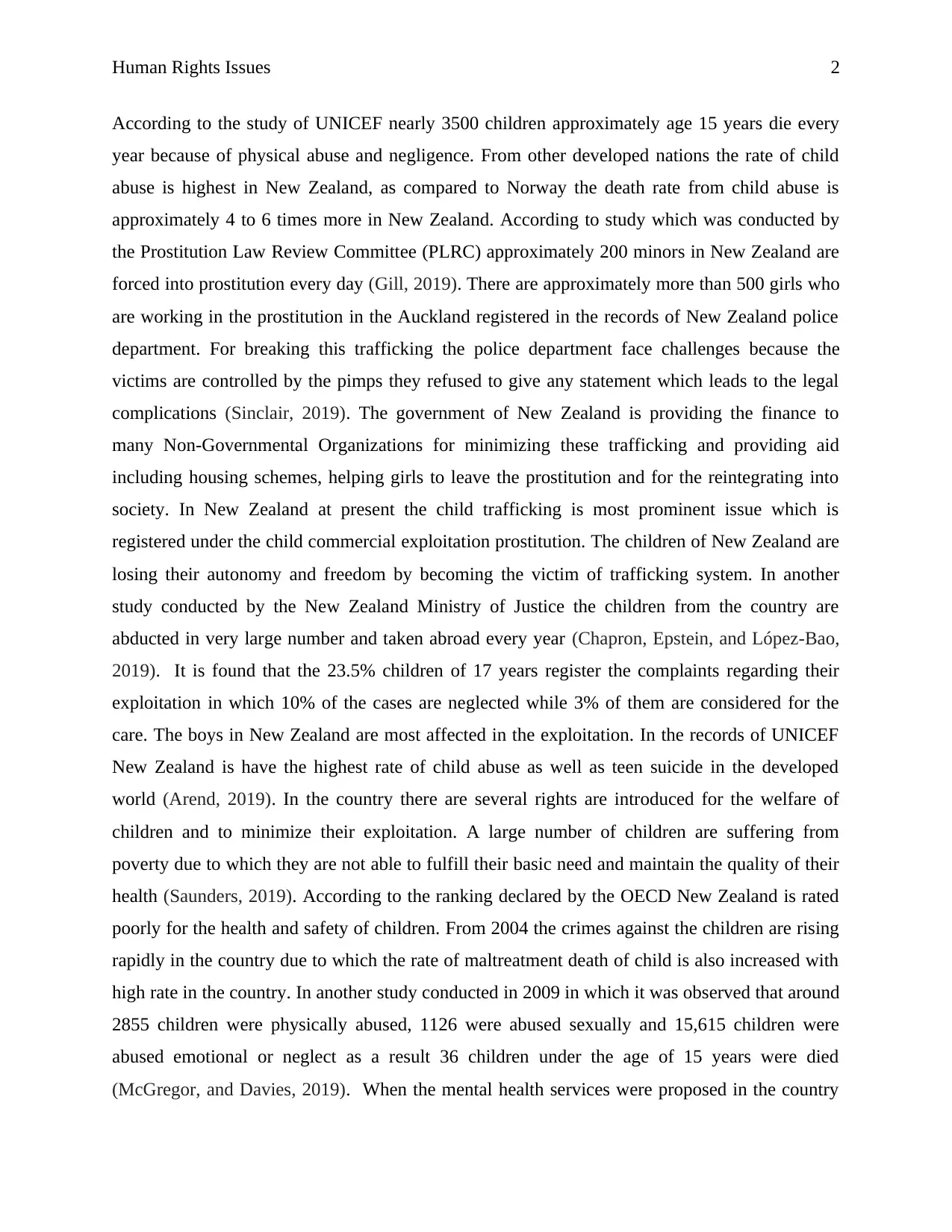
Human Rights Issues 2
According to the study of UNICEF nearly 3500 children approximately age 15 years die every
year because of physical abuse and negligence. From other developed nations the rate of child
abuse is highest in New Zealand, as compared to Norway the death rate from child abuse is
approximately 4 to 6 times more in New Zealand. According to study which was conducted by
the Prostitution Law Review Committee (PLRC) approximately 200 minors in New Zealand are
forced into prostitution every day (Gill, 2019). There are approximately more than 500 girls who
are working in the prostitution in the Auckland registered in the records of New Zealand police
department. For breaking this trafficking the police department face challenges because the
victims are controlled by the pimps they refused to give any statement which leads to the legal
complications (Sinclair, 2019). The government of New Zealand is providing the finance to
many Non-Governmental Organizations for minimizing these trafficking and providing aid
including housing schemes, helping girls to leave the prostitution and for the reintegrating into
society. In New Zealand at present the child trafficking is most prominent issue which is
registered under the child commercial exploitation prostitution. The children of New Zealand are
losing their autonomy and freedom by becoming the victim of trafficking system. In another
study conducted by the New Zealand Ministry of Justice the children from the country are
abducted in very large number and taken abroad every year (Chapron, Epstein, and López-Bao,
2019). It is found that the 23.5% children of 17 years register the complaints regarding their
exploitation in which 10% of the cases are neglected while 3% of them are considered for the
care. The boys in New Zealand are most affected in the exploitation. In the records of UNICEF
New Zealand is have the highest rate of child abuse as well as teen suicide in the developed
world (Arend, 2019). In the country there are several rights are introduced for the welfare of
children and to minimize their exploitation. A large number of children are suffering from
poverty due to which they are not able to fulfill their basic need and maintain the quality of their
health (Saunders, 2019). According to the ranking declared by the OECD New Zealand is rated
poorly for the health and safety of children. From 2004 the crimes against the children are rising
rapidly in the country due to which the rate of maltreatment death of child is also increased with
high rate in the country. In another study conducted in 2009 in which it was observed that around
2855 children were physically abused, 1126 were abused sexually and 15,615 children were
abused emotional or neglect as a result 36 children under the age of 15 years were died
(McGregor, and Davies, 2019). When the mental health services were proposed in the country
According to the study of UNICEF nearly 3500 children approximately age 15 years die every
year because of physical abuse and negligence. From other developed nations the rate of child
abuse is highest in New Zealand, as compared to Norway the death rate from child abuse is
approximately 4 to 6 times more in New Zealand. According to study which was conducted by
the Prostitution Law Review Committee (PLRC) approximately 200 minors in New Zealand are
forced into prostitution every day (Gill, 2019). There are approximately more than 500 girls who
are working in the prostitution in the Auckland registered in the records of New Zealand police
department. For breaking this trafficking the police department face challenges because the
victims are controlled by the pimps they refused to give any statement which leads to the legal
complications (Sinclair, 2019). The government of New Zealand is providing the finance to
many Non-Governmental Organizations for minimizing these trafficking and providing aid
including housing schemes, helping girls to leave the prostitution and for the reintegrating into
society. In New Zealand at present the child trafficking is most prominent issue which is
registered under the child commercial exploitation prostitution. The children of New Zealand are
losing their autonomy and freedom by becoming the victim of trafficking system. In another
study conducted by the New Zealand Ministry of Justice the children from the country are
abducted in very large number and taken abroad every year (Chapron, Epstein, and López-Bao,
2019). It is found that the 23.5% children of 17 years register the complaints regarding their
exploitation in which 10% of the cases are neglected while 3% of them are considered for the
care. The boys in New Zealand are most affected in the exploitation. In the records of UNICEF
New Zealand is have the highest rate of child abuse as well as teen suicide in the developed
world (Arend, 2019). In the country there are several rights are introduced for the welfare of
children and to minimize their exploitation. A large number of children are suffering from
poverty due to which they are not able to fulfill their basic need and maintain the quality of their
health (Saunders, 2019). According to the ranking declared by the OECD New Zealand is rated
poorly for the health and safety of children. From 2004 the crimes against the children are rising
rapidly in the country due to which the rate of maltreatment death of child is also increased with
high rate in the country. In another study conducted in 2009 in which it was observed that around
2855 children were physically abused, 1126 were abused sexually and 15,615 children were
abused emotional or neglect as a result 36 children under the age of 15 years were died
(McGregor, and Davies, 2019). When the mental health services were proposed in the country
⊘ This is a preview!⊘
Do you want full access?
Subscribe today to unlock all pages.

Trusted by 1+ million students worldwide
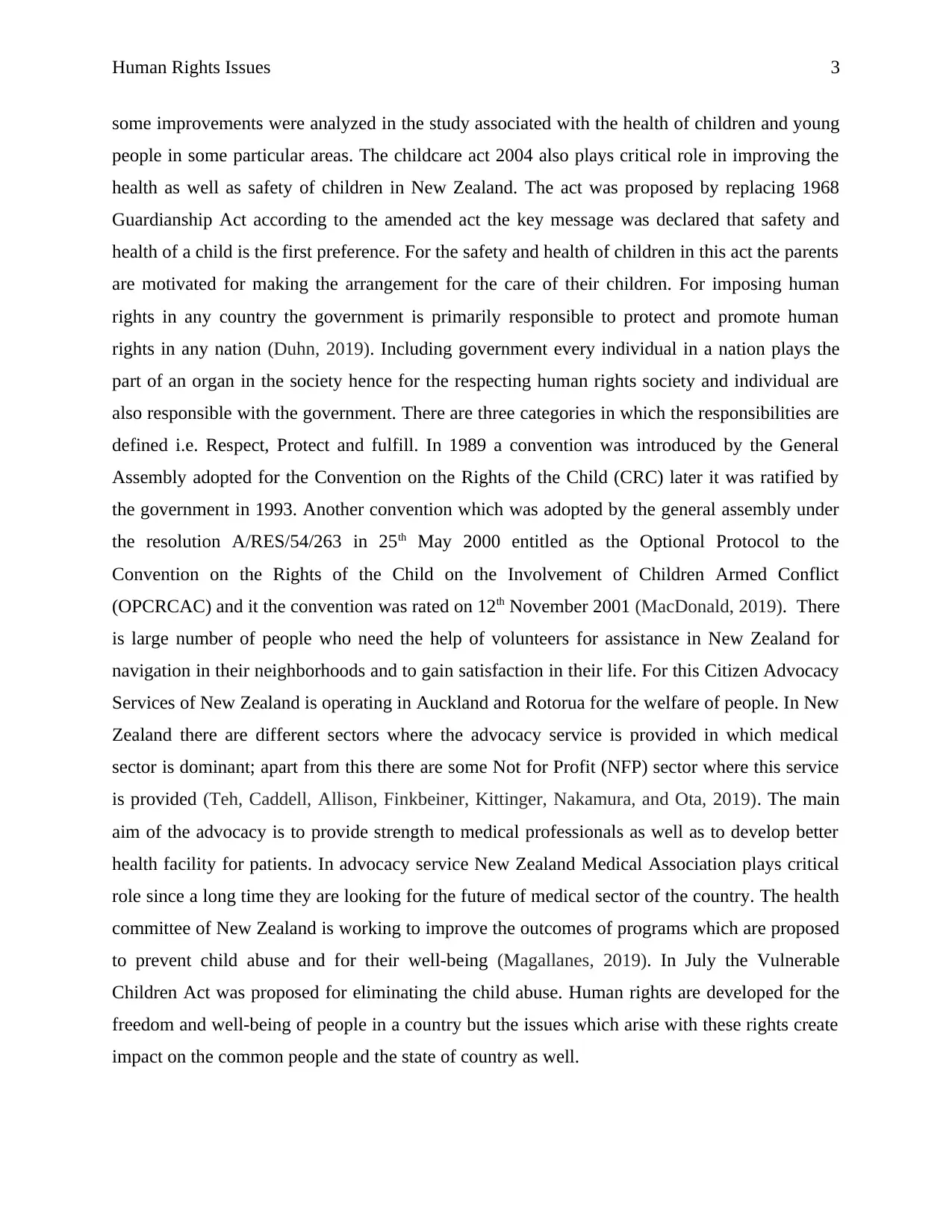
Human Rights Issues 3
some improvements were analyzed in the study associated with the health of children and young
people in some particular areas. The childcare act 2004 also plays critical role in improving the
health as well as safety of children in New Zealand. The act was proposed by replacing 1968
Guardianship Act according to the amended act the key message was declared that safety and
health of a child is the first preference. For the safety and health of children in this act the parents
are motivated for making the arrangement for the care of their children. For imposing human
rights in any country the government is primarily responsible to protect and promote human
rights in any nation (Duhn, 2019). Including government every individual in a nation plays the
part of an organ in the society hence for the respecting human rights society and individual are
also responsible with the government. There are three categories in which the responsibilities are
defined i.e. Respect, Protect and fulfill. In 1989 a convention was introduced by the General
Assembly adopted for the Convention on the Rights of the Child (CRC) later it was ratified by
the government in 1993. Another convention which was adopted by the general assembly under
the resolution A/RES/54/263 in 25th May 2000 entitled as the Optional Protocol to the
Convention on the Rights of the Child on the Involvement of Children Armed Conflict
(OPCRCAC) and it the convention was rated on 12th November 2001 (MacDonald, 2019). There
is large number of people who need the help of volunteers for assistance in New Zealand for
navigation in their neighborhoods and to gain satisfaction in their life. For this Citizen Advocacy
Services of New Zealand is operating in Auckland and Rotorua for the welfare of people. In New
Zealand there are different sectors where the advocacy service is provided in which medical
sector is dominant; apart from this there are some Not for Profit (NFP) sector where this service
is provided (Teh, Caddell, Allison, Finkbeiner, Kittinger, Nakamura, and Ota, 2019). The main
aim of the advocacy is to provide strength to medical professionals as well as to develop better
health facility for patients. In advocacy service New Zealand Medical Association plays critical
role since a long time they are looking for the future of medical sector of the country. The health
committee of New Zealand is working to improve the outcomes of programs which are proposed
to prevent child abuse and for their well-being (Magallanes, 2019). In July the Vulnerable
Children Act was proposed for eliminating the child abuse. Human rights are developed for the
freedom and well-being of people in a country but the issues which arise with these rights create
impact on the common people and the state of country as well.
some improvements were analyzed in the study associated with the health of children and young
people in some particular areas. The childcare act 2004 also plays critical role in improving the
health as well as safety of children in New Zealand. The act was proposed by replacing 1968
Guardianship Act according to the amended act the key message was declared that safety and
health of a child is the first preference. For the safety and health of children in this act the parents
are motivated for making the arrangement for the care of their children. For imposing human
rights in any country the government is primarily responsible to protect and promote human
rights in any nation (Duhn, 2019). Including government every individual in a nation plays the
part of an organ in the society hence for the respecting human rights society and individual are
also responsible with the government. There are three categories in which the responsibilities are
defined i.e. Respect, Protect and fulfill. In 1989 a convention was introduced by the General
Assembly adopted for the Convention on the Rights of the Child (CRC) later it was ratified by
the government in 1993. Another convention which was adopted by the general assembly under
the resolution A/RES/54/263 in 25th May 2000 entitled as the Optional Protocol to the
Convention on the Rights of the Child on the Involvement of Children Armed Conflict
(OPCRCAC) and it the convention was rated on 12th November 2001 (MacDonald, 2019). There
is large number of people who need the help of volunteers for assistance in New Zealand for
navigation in their neighborhoods and to gain satisfaction in their life. For this Citizen Advocacy
Services of New Zealand is operating in Auckland and Rotorua for the welfare of people. In New
Zealand there are different sectors where the advocacy service is provided in which medical
sector is dominant; apart from this there are some Not for Profit (NFP) sector where this service
is provided (Teh, Caddell, Allison, Finkbeiner, Kittinger, Nakamura, and Ota, 2019). The main
aim of the advocacy is to provide strength to medical professionals as well as to develop better
health facility for patients. In advocacy service New Zealand Medical Association plays critical
role since a long time they are looking for the future of medical sector of the country. The health
committee of New Zealand is working to improve the outcomes of programs which are proposed
to prevent child abuse and for their well-being (Magallanes, 2019). In July the Vulnerable
Children Act was proposed for eliminating the child abuse. Human rights are developed for the
freedom and well-being of people in a country but the issues which arise with these rights create
impact on the common people and the state of country as well.
Paraphrase This Document
Need a fresh take? Get an instant paraphrase of this document with our AI Paraphraser
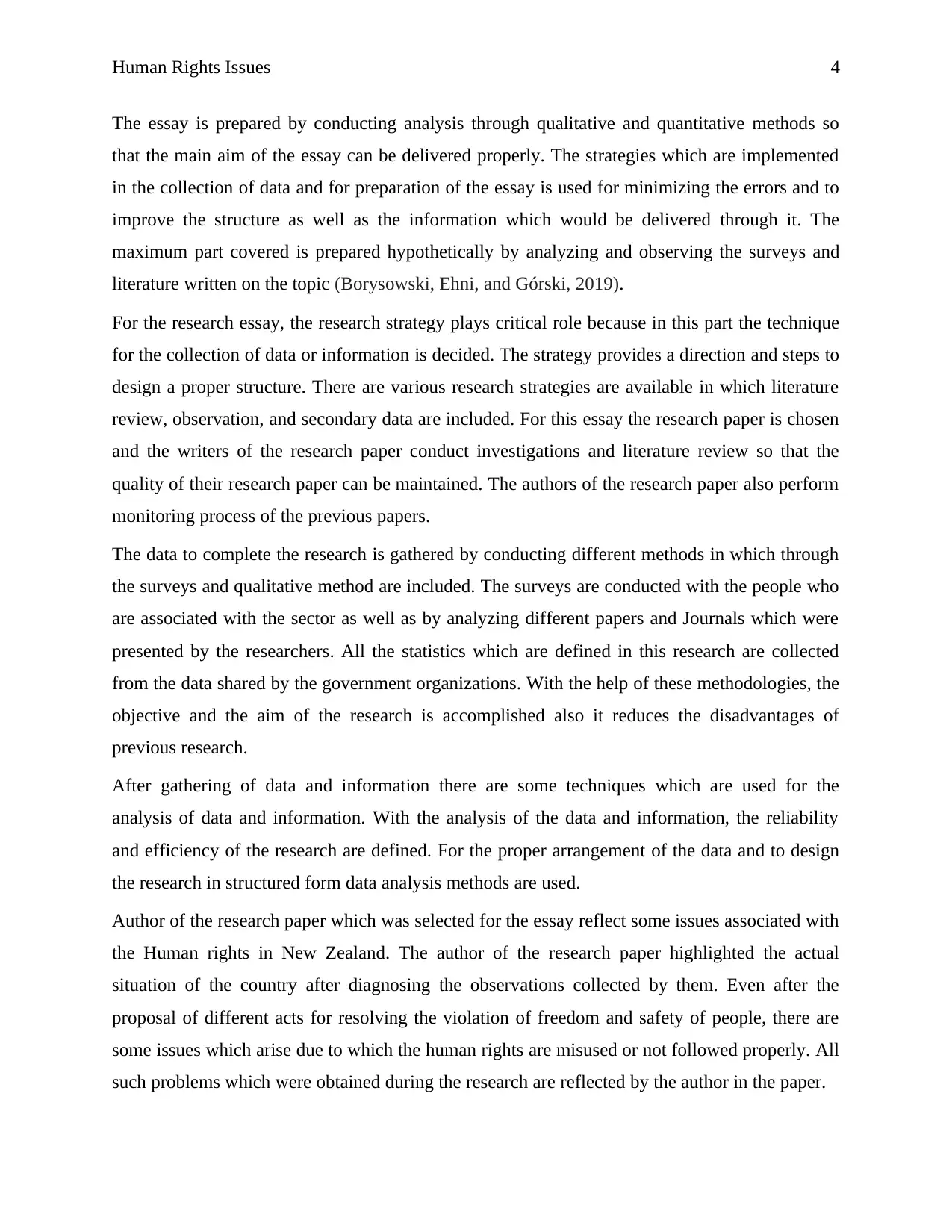
Human Rights Issues 4
The essay is prepared by conducting analysis through qualitative and quantitative methods so
that the main aim of the essay can be delivered properly. The strategies which are implemented
in the collection of data and for preparation of the essay is used for minimizing the errors and to
improve the structure as well as the information which would be delivered through it. The
maximum part covered is prepared hypothetically by analyzing and observing the surveys and
literature written on the topic (Borysowski, Ehni, and Górski, 2019).
For the research essay, the research strategy plays critical role because in this part the technique
for the collection of data or information is decided. The strategy provides a direction and steps to
design a proper structure. There are various research strategies are available in which literature
review, observation, and secondary data are included. For this essay the research paper is chosen
and the writers of the research paper conduct investigations and literature review so that the
quality of their research paper can be maintained. The authors of the research paper also perform
monitoring process of the previous papers.
The data to complete the research is gathered by conducting different methods in which through
the surveys and qualitative method are included. The surveys are conducted with the people who
are associated with the sector as well as by analyzing different papers and Journals which were
presented by the researchers. All the statistics which are defined in this research are collected
from the data shared by the government organizations. With the help of these methodologies, the
objective and the aim of the research is accomplished also it reduces the disadvantages of
previous research.
After gathering of data and information there are some techniques which are used for the
analysis of data and information. With the analysis of the data and information, the reliability
and efficiency of the research are defined. For the proper arrangement of the data and to design
the research in structured form data analysis methods are used.
Author of the research paper which was selected for the essay reflect some issues associated with
the Human rights in New Zealand. The author of the research paper highlighted the actual
situation of the country after diagnosing the observations collected by them. Even after the
proposal of different acts for resolving the violation of freedom and safety of people, there are
some issues which arise due to which the human rights are misused or not followed properly. All
such problems which were obtained during the research are reflected by the author in the paper.
The essay is prepared by conducting analysis through qualitative and quantitative methods so
that the main aim of the essay can be delivered properly. The strategies which are implemented
in the collection of data and for preparation of the essay is used for minimizing the errors and to
improve the structure as well as the information which would be delivered through it. The
maximum part covered is prepared hypothetically by analyzing and observing the surveys and
literature written on the topic (Borysowski, Ehni, and Górski, 2019).
For the research essay, the research strategy plays critical role because in this part the technique
for the collection of data or information is decided. The strategy provides a direction and steps to
design a proper structure. There are various research strategies are available in which literature
review, observation, and secondary data are included. For this essay the research paper is chosen
and the writers of the research paper conduct investigations and literature review so that the
quality of their research paper can be maintained. The authors of the research paper also perform
monitoring process of the previous papers.
The data to complete the research is gathered by conducting different methods in which through
the surveys and qualitative method are included. The surveys are conducted with the people who
are associated with the sector as well as by analyzing different papers and Journals which were
presented by the researchers. All the statistics which are defined in this research are collected
from the data shared by the government organizations. With the help of these methodologies, the
objective and the aim of the research is accomplished also it reduces the disadvantages of
previous research.
After gathering of data and information there are some techniques which are used for the
analysis of data and information. With the analysis of the data and information, the reliability
and efficiency of the research are defined. For the proper arrangement of the data and to design
the research in structured form data analysis methods are used.
Author of the research paper which was selected for the essay reflect some issues associated with
the Human rights in New Zealand. The author of the research paper highlighted the actual
situation of the country after diagnosing the observations collected by them. Even after the
proposal of different acts for resolving the violation of freedom and safety of people, there are
some issues which arise due to which the human rights are misused or not followed properly. All
such problems which were obtained during the research are reflected by the author in the paper.
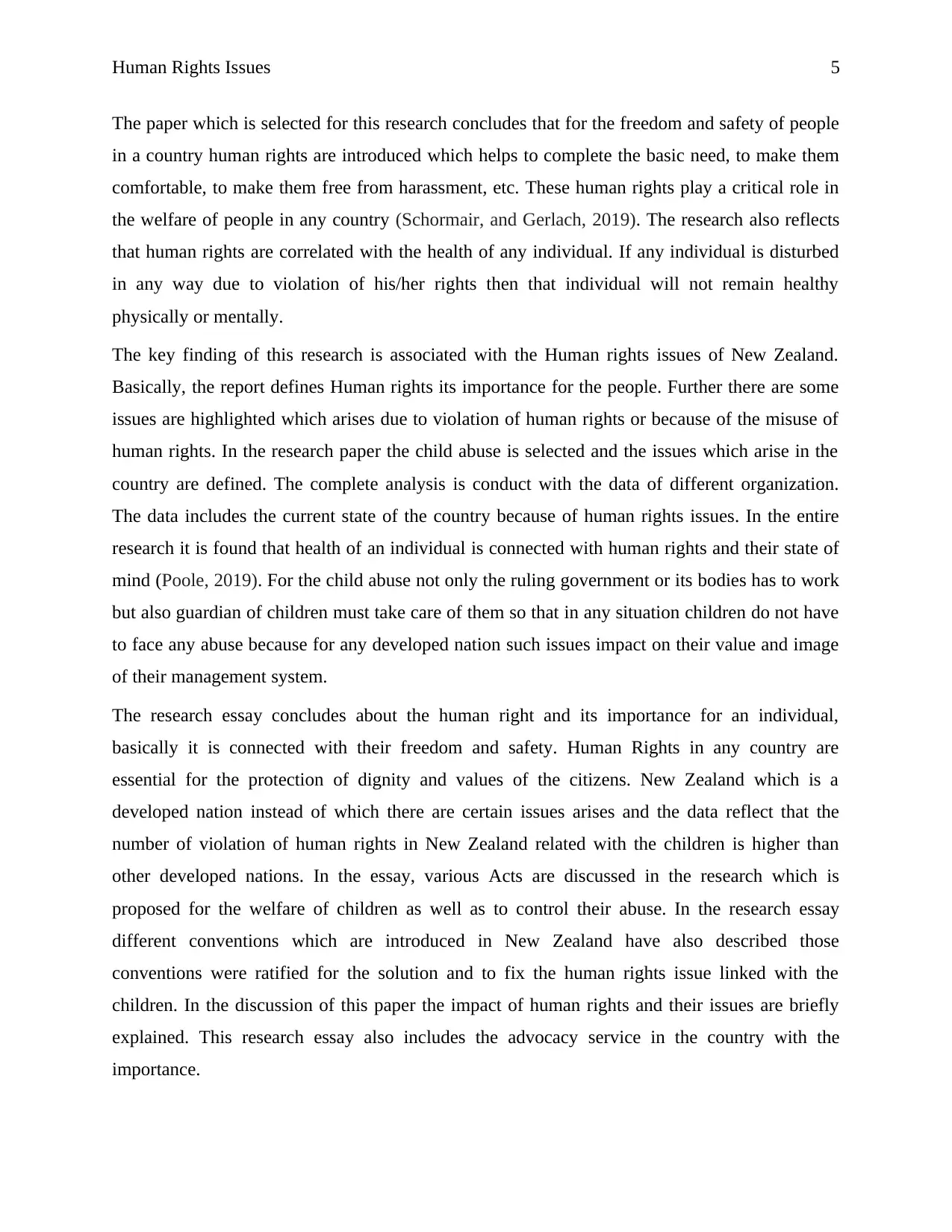
Human Rights Issues 5
The paper which is selected for this research concludes that for the freedom and safety of people
in a country human rights are introduced which helps to complete the basic need, to make them
comfortable, to make them free from harassment, etc. These human rights play a critical role in
the welfare of people in any country (Schormair, and Gerlach, 2019). The research also reflects
that human rights are correlated with the health of any individual. If any individual is disturbed
in any way due to violation of his/her rights then that individual will not remain healthy
physically or mentally.
The key finding of this research is associated with the Human rights issues of New Zealand.
Basically, the report defines Human rights its importance for the people. Further there are some
issues are highlighted which arises due to violation of human rights or because of the misuse of
human rights. In the research paper the child abuse is selected and the issues which arise in the
country are defined. The complete analysis is conduct with the data of different organization.
The data includes the current state of the country because of human rights issues. In the entire
research it is found that health of an individual is connected with human rights and their state of
mind (Poole, 2019). For the child abuse not only the ruling government or its bodies has to work
but also guardian of children must take care of them so that in any situation children do not have
to face any abuse because for any developed nation such issues impact on their value and image
of their management system.
The research essay concludes about the human right and its importance for an individual,
basically it is connected with their freedom and safety. Human Rights in any country are
essential for the protection of dignity and values of the citizens. New Zealand which is a
developed nation instead of which there are certain issues arises and the data reflect that the
number of violation of human rights in New Zealand related with the children is higher than
other developed nations. In the essay, various Acts are discussed in the research which is
proposed for the welfare of children as well as to control their abuse. In the research essay
different conventions which are introduced in New Zealand have also described those
conventions were ratified for the solution and to fix the human rights issue linked with the
children. In the discussion of this paper the impact of human rights and their issues are briefly
explained. This research essay also includes the advocacy service in the country with the
importance.
The paper which is selected for this research concludes that for the freedom and safety of people
in a country human rights are introduced which helps to complete the basic need, to make them
comfortable, to make them free from harassment, etc. These human rights play a critical role in
the welfare of people in any country (Schormair, and Gerlach, 2019). The research also reflects
that human rights are correlated with the health of any individual. If any individual is disturbed
in any way due to violation of his/her rights then that individual will not remain healthy
physically or mentally.
The key finding of this research is associated with the Human rights issues of New Zealand.
Basically, the report defines Human rights its importance for the people. Further there are some
issues are highlighted which arises due to violation of human rights or because of the misuse of
human rights. In the research paper the child abuse is selected and the issues which arise in the
country are defined. The complete analysis is conduct with the data of different organization.
The data includes the current state of the country because of human rights issues. In the entire
research it is found that health of an individual is connected with human rights and their state of
mind (Poole, 2019). For the child abuse not only the ruling government or its bodies has to work
but also guardian of children must take care of them so that in any situation children do not have
to face any abuse because for any developed nation such issues impact on their value and image
of their management system.
The research essay concludes about the human right and its importance for an individual,
basically it is connected with their freedom and safety. Human Rights in any country are
essential for the protection of dignity and values of the citizens. New Zealand which is a
developed nation instead of which there are certain issues arises and the data reflect that the
number of violation of human rights in New Zealand related with the children is higher than
other developed nations. In the essay, various Acts are discussed in the research which is
proposed for the welfare of children as well as to control their abuse. In the research essay
different conventions which are introduced in New Zealand have also described those
conventions were ratified for the solution and to fix the human rights issue linked with the
children. In the discussion of this paper the impact of human rights and their issues are briefly
explained. This research essay also includes the advocacy service in the country with the
importance.
⊘ This is a preview!⊘
Do you want full access?
Subscribe today to unlock all pages.

Trusted by 1+ million students worldwide
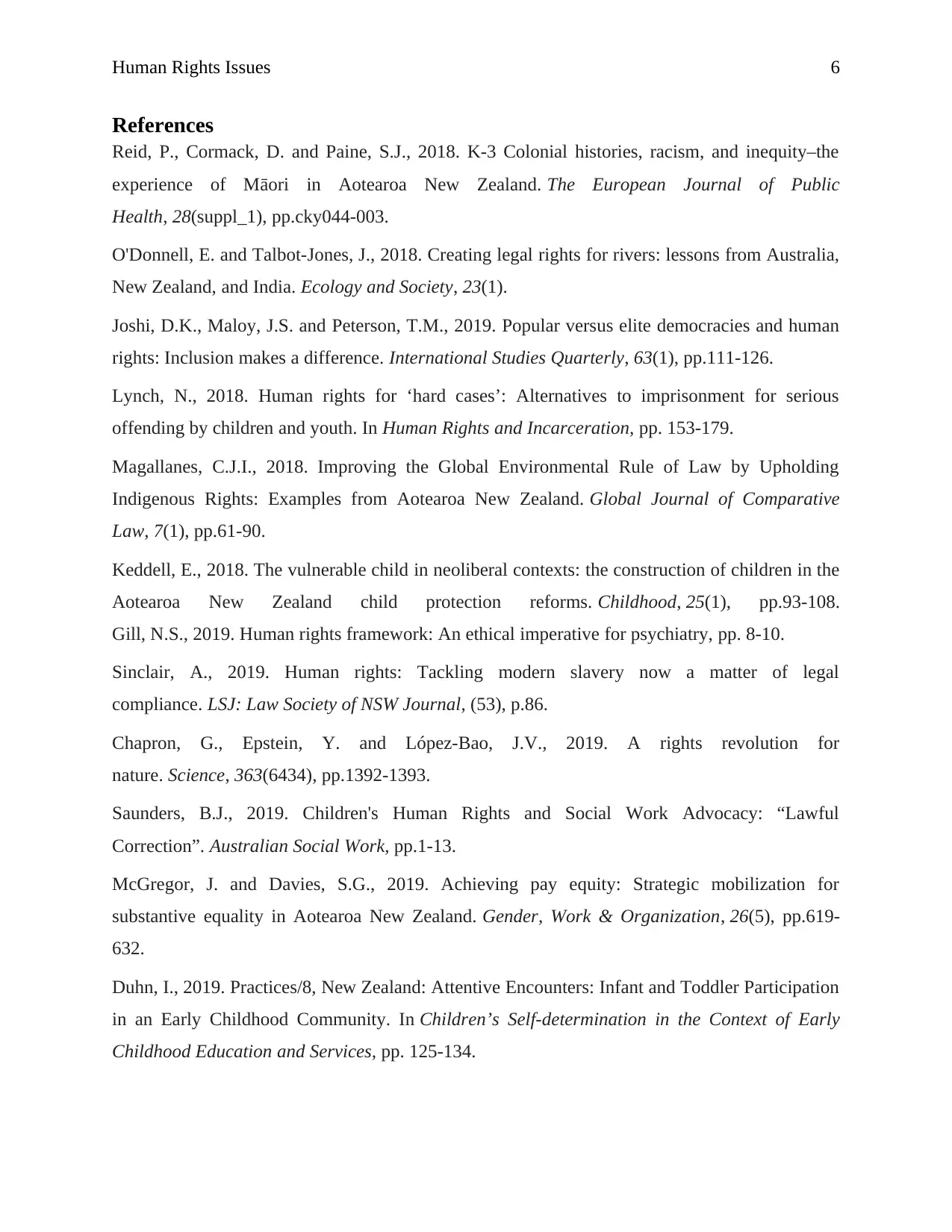
Human Rights Issues 6
References
Reid, P., Cormack, D. and Paine, S.J., 2018. K-3 Colonial histories, racism, and inequity–the
experience of Māori in Aotearoa New Zealand. The European Journal of Public
Health, 28(suppl_1), pp.cky044-003.
O'Donnell, E. and Talbot-Jones, J., 2018. Creating legal rights for rivers: lessons from Australia,
New Zealand, and India. Ecology and Society, 23(1).
Joshi, D.K., Maloy, J.S. and Peterson, T.M., 2019. Popular versus elite democracies and human
rights: Inclusion makes a difference. International Studies Quarterly, 63(1), pp.111-126.
Lynch, N., 2018. Human rights for ‘hard cases’: Alternatives to imprisonment for serious
offending by children and youth. In Human Rights and Incarceration, pp. 153-179.
Magallanes, C.J.I., 2018. Improving the Global Environmental Rule of Law by Upholding
Indigenous Rights: Examples from Aotearoa New Zealand. Global Journal of Comparative
Law, 7(1), pp.61-90.
Keddell, E., 2018. The vulnerable child in neoliberal contexts: the construction of children in the
Aotearoa New Zealand child protection reforms. Childhood, 25(1), pp.93-108.
Gill, N.S., 2019. Human rights framework: An ethical imperative for psychiatry, pp. 8-10.
Sinclair, A., 2019. Human rights: Tackling modern slavery now a matter of legal
compliance. LSJ: Law Society of NSW Journal, (53), p.86.
Chapron, G., Epstein, Y. and López-Bao, J.V., 2019. A rights revolution for
nature. Science, 363(6434), pp.1392-1393.
Saunders, B.J., 2019. Children's Human Rights and Social Work Advocacy: “Lawful
Correction”. Australian Social Work, pp.1-13.
McGregor, J. and Davies, S.G., 2019. Achieving pay equity: Strategic mobilization for
substantive equality in Aotearoa New Zealand. Gender, Work & Organization, 26(5), pp.619-
632.
Duhn, I., 2019. Practices/8, New Zealand: Attentive Encounters: Infant and Toddler Participation
in an Early Childhood Community. In Children’s Self-determination in the Context of Early
Childhood Education and Services, pp. 125-134.
References
Reid, P., Cormack, D. and Paine, S.J., 2018. K-3 Colonial histories, racism, and inequity–the
experience of Māori in Aotearoa New Zealand. The European Journal of Public
Health, 28(suppl_1), pp.cky044-003.
O'Donnell, E. and Talbot-Jones, J., 2018. Creating legal rights for rivers: lessons from Australia,
New Zealand, and India. Ecology and Society, 23(1).
Joshi, D.K., Maloy, J.S. and Peterson, T.M., 2019. Popular versus elite democracies and human
rights: Inclusion makes a difference. International Studies Quarterly, 63(1), pp.111-126.
Lynch, N., 2018. Human rights for ‘hard cases’: Alternatives to imprisonment for serious
offending by children and youth. In Human Rights and Incarceration, pp. 153-179.
Magallanes, C.J.I., 2018. Improving the Global Environmental Rule of Law by Upholding
Indigenous Rights: Examples from Aotearoa New Zealand. Global Journal of Comparative
Law, 7(1), pp.61-90.
Keddell, E., 2018. The vulnerable child in neoliberal contexts: the construction of children in the
Aotearoa New Zealand child protection reforms. Childhood, 25(1), pp.93-108.
Gill, N.S., 2019. Human rights framework: An ethical imperative for psychiatry, pp. 8-10.
Sinclair, A., 2019. Human rights: Tackling modern slavery now a matter of legal
compliance. LSJ: Law Society of NSW Journal, (53), p.86.
Chapron, G., Epstein, Y. and López-Bao, J.V., 2019. A rights revolution for
nature. Science, 363(6434), pp.1392-1393.
Saunders, B.J., 2019. Children's Human Rights and Social Work Advocacy: “Lawful
Correction”. Australian Social Work, pp.1-13.
McGregor, J. and Davies, S.G., 2019. Achieving pay equity: Strategic mobilization for
substantive equality in Aotearoa New Zealand. Gender, Work & Organization, 26(5), pp.619-
632.
Duhn, I., 2019. Practices/8, New Zealand: Attentive Encounters: Infant and Toddler Participation
in an Early Childhood Community. In Children’s Self-determination in the Context of Early
Childhood Education and Services, pp. 125-134.
Paraphrase This Document
Need a fresh take? Get an instant paraphrase of this document with our AI Paraphraser
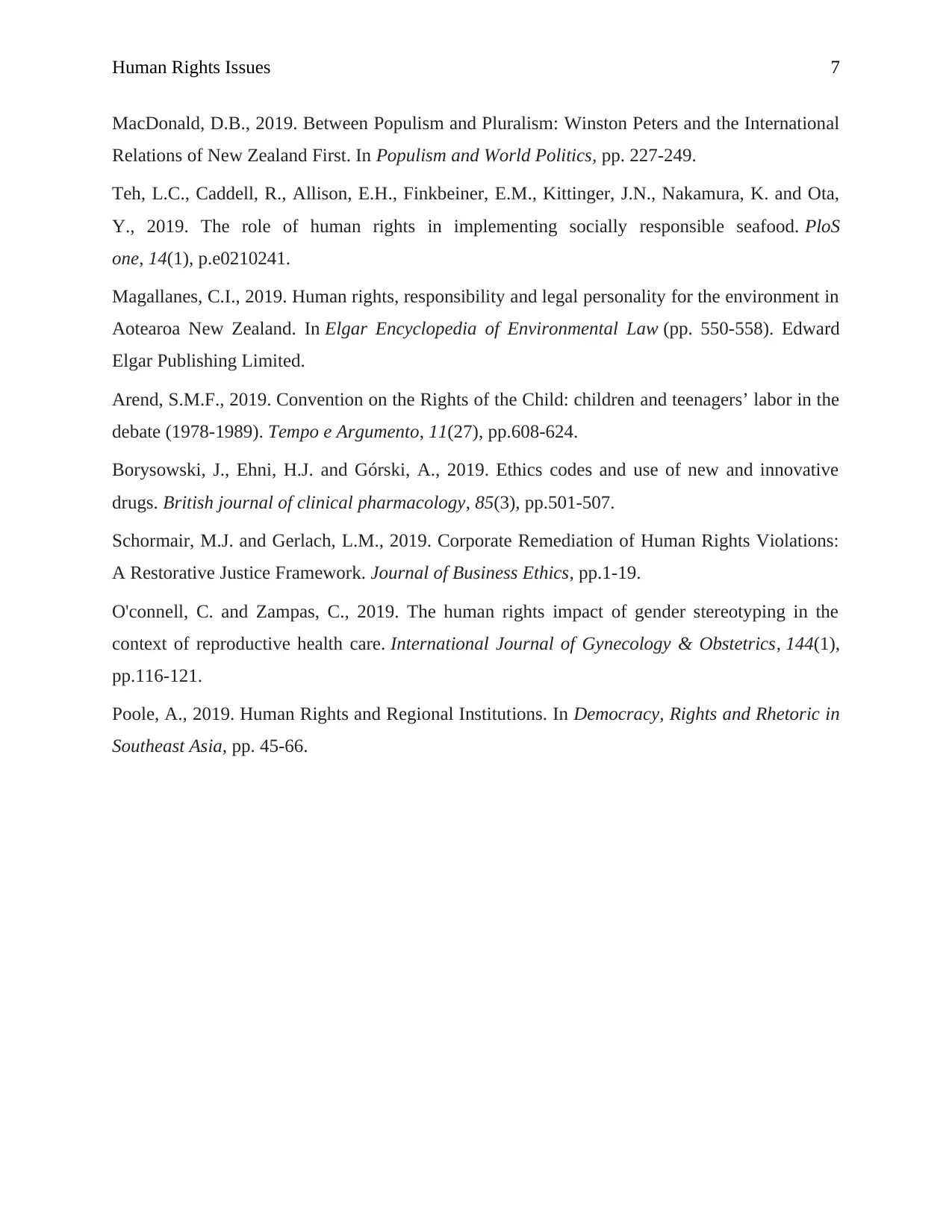
Human Rights Issues 7
MacDonald, D.B., 2019. Between Populism and Pluralism: Winston Peters and the International
Relations of New Zealand First. In Populism and World Politics, pp. 227-249.
Teh, L.C., Caddell, R., Allison, E.H., Finkbeiner, E.M., Kittinger, J.N., Nakamura, K. and Ota,
Y., 2019. The role of human rights in implementing socially responsible seafood. PloS
one, 14(1), p.e0210241.
Magallanes, C.I., 2019. Human rights, responsibility and legal personality for the environment in
Aotearoa New Zealand. In Elgar Encyclopedia of Environmental Law (pp. 550-558). Edward
Elgar Publishing Limited.
Arend, S.M.F., 2019. Convention on the Rights of the Child: children and teenagers’ labor in the
debate (1978-1989). Tempo e Argumento, 11(27), pp.608-624.
Borysowski, J., Ehni, H.J. and Górski, A., 2019. Ethics codes and use of new and innovative
drugs. British journal of clinical pharmacology, 85(3), pp.501-507.
Schormair, M.J. and Gerlach, L.M., 2019. Corporate Remediation of Human Rights Violations:
A Restorative Justice Framework. Journal of Business Ethics, pp.1-19.
O'connell, C. and Zampas, C., 2019. The human rights impact of gender stereotyping in the
context of reproductive health care. International Journal of Gynecology & Obstetrics, 144(1),
pp.116-121.
Poole, A., 2019. Human Rights and Regional Institutions. In Democracy, Rights and Rhetoric in
Southeast Asia, pp. 45-66.
MacDonald, D.B., 2019. Between Populism and Pluralism: Winston Peters and the International
Relations of New Zealand First. In Populism and World Politics, pp. 227-249.
Teh, L.C., Caddell, R., Allison, E.H., Finkbeiner, E.M., Kittinger, J.N., Nakamura, K. and Ota,
Y., 2019. The role of human rights in implementing socially responsible seafood. PloS
one, 14(1), p.e0210241.
Magallanes, C.I., 2019. Human rights, responsibility and legal personality for the environment in
Aotearoa New Zealand. In Elgar Encyclopedia of Environmental Law (pp. 550-558). Edward
Elgar Publishing Limited.
Arend, S.M.F., 2019. Convention on the Rights of the Child: children and teenagers’ labor in the
debate (1978-1989). Tempo e Argumento, 11(27), pp.608-624.
Borysowski, J., Ehni, H.J. and Górski, A., 2019. Ethics codes and use of new and innovative
drugs. British journal of clinical pharmacology, 85(3), pp.501-507.
Schormair, M.J. and Gerlach, L.M., 2019. Corporate Remediation of Human Rights Violations:
A Restorative Justice Framework. Journal of Business Ethics, pp.1-19.
O'connell, C. and Zampas, C., 2019. The human rights impact of gender stereotyping in the
context of reproductive health care. International Journal of Gynecology & Obstetrics, 144(1),
pp.116-121.
Poole, A., 2019. Human Rights and Regional Institutions. In Democracy, Rights and Rhetoric in
Southeast Asia, pp. 45-66.
1 out of 8
Related Documents
Your All-in-One AI-Powered Toolkit for Academic Success.
+13062052269
info@desklib.com
Available 24*7 on WhatsApp / Email
![[object Object]](/_next/static/media/star-bottom.7253800d.svg)
Unlock your academic potential
Copyright © 2020–2026 A2Z Services. All Rights Reserved. Developed and managed by ZUCOL.





